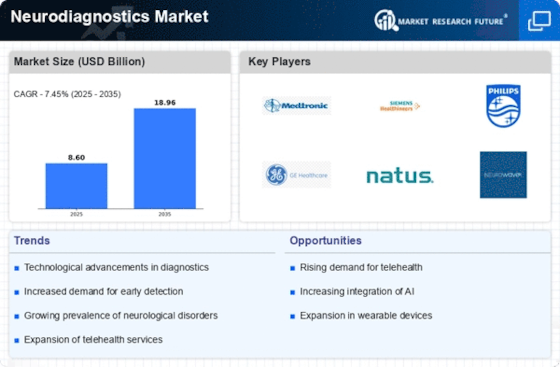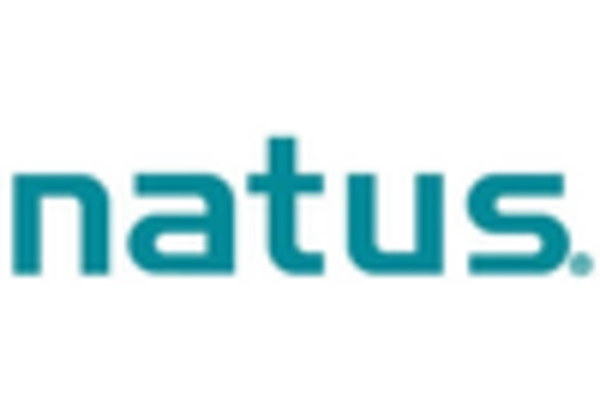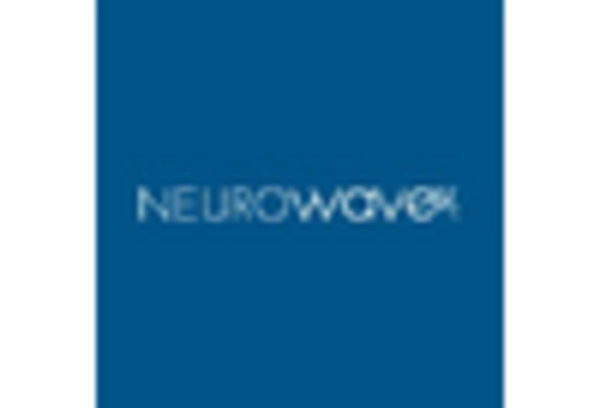Diagnostic Imaging Systems
Clinical Diagnostic Instruments
Reagents and Consumables
Neurodegenerative Diseases
Stroke
Epilepsy
Headache Disorders
Sleep Disorders
Others
Hospitals and Surgical Centers
Diagnostic Laboratories and Imaging Centers
Neurology Centers
Ambulatory Care Centers
Research Laboratories and Academic Institutes
North America Neurodiagnostics by Product TypeDiagnostic Imaging Systems
Clinical Diagnostic Instruments
Reagents and Consumables
North America Neurodiagnostics by ConditionNeurodegenerative Diseases
Stroke
Epilepsy
Headache Disorders
Sleep Disorders
Others
North America Neurodiagnostics by End UserHospitals and Surgical Centers
Diagnostic Laboratories and Imaging Centers
Neurology Centers
Ambulatory Care Centers
Research Laboratories and Academic Institutes
US Outlook (USD Billion, 2019-2030)
US Neurodiagnostics by Product TypeDiagnostic Imaging Systems
Clinical Diagnostic Instruments
Reagents and Consumables
US Neurodiagnostics by ConditionNeurodegenerative Diseases
Stroke
Epilepsy
Headache Disorders
Sleep Disorders
Others
US Neurodiagnostics by End UserHospitals and Surgical Centers
Diagnostic Laboratories and Imaging Centers
Neurology Centers
Ambulatory Care Centers
Research Laboratories and Academic Institutes
Canada Neurodiagnostics by Product TypeDiagnostic Imaging Systems
Clinical Diagnostic Instruments
Reagents and Consumables
Canada Neurodiagnostics by ConditionNeurodegenerative Diseases
Stroke
Epilepsy
Headache Disorders
Sleep Disorders
Others
Canada Neurodiagnostics by End UserHospitals and Surgical Centers
Diagnostic Laboratories and Imaging Centers
Neurology Centers
Ambulatory Care Centers
Research Laboratories and Academic Institutes
Europe Neurodiagnostics by Product TypeDiagnostic Imaging Systems
Clinical Diagnostic Instruments
Reagents and Consumables
Europe Neurodiagnostics by ConditionNeurodegenerative Diseases
Stroke
Epilepsy
Headache Disorders
Sleep Disorders
Others
Europe Neurodiagnostics by End UserHospitals and Surgical Centers
Diagnostic Laboratories and Imaging Centers
Neurology Centers
Ambulatory Care Centers
Research Laboratories and Academic Institutes
Germany Outlook (USD Billion, 2019-2030)
Germany Neurodiagnostics by Product TypeDiagnostic Imaging Systems
Clinical Diagnostic Instruments
Reagents and Consumables
Germany Neurodiagnostics by ConditionNeurodegenerative Diseases
Stroke
Epilepsy
Headache Disorders
Sleep Disorders
Others
Germany Neurodiagnostics by End UserHospitals and Surgical Centers
Diagnostic Laboratories and Imaging Centers
Neurology Centers
Ambulatory Care Centers
Research Laboratories and Academic Institutes
France Neurodiagnostics by Product TypeDiagnostic Imaging Systems
Clinical Diagnostic Instruments
Reagents and Consumables
France Neurodiagnostics by ConditionNeurodegenerative Diseases
Stroke
Epilepsy
Headache Disorders
Sleep Disorders
Others
France Neurodiagnostics by End UserHospitals and Surgical Centers
Diagnostic Laboratories and Imaging Centers
Neurology Centers
Ambulatory Care Centers
Research Laboratories and Academic Institutes
UK Neurodiagnostics by Product TypeDiagnostic Imaging Systems
Clinical Diagnostic Instruments
Reagents and Consumables
UK Neurodiagnostics by ConditionNeurodegenerative Diseases
Stroke
Epilepsy
Headache Disorders
Sleep Disorders
Others
UK Neurodiagnostics by End UserHospitals and Surgical Centers
Diagnostic Laboratories and Imaging Centers
Neurology Centers
Ambulatory Care Centers
Research Laboratories and Academic Institutes
Italy Neurodiagnostics by Product TypeDiagnostic Imaging Systems
Clinical Diagnostic Instruments
Reagents and Consumables
Italy Neurodiagnostics by ConditionNeurodegenerative Diseases
Stroke
Epilepsy
Headache Disorders
Sleep Disorders
Others
Italy Neurodiagnostics by End UserHospitals and Surgical Centers
Diagnostic Laboratories and Imaging Centers
Neurology Centers
Ambulatory Care Centers
Research Laboratories and Academic Institutes
Spain Neurodiagnostics by Product TypeDiagnostic Imaging Systems
Clinical Diagnostic Instruments
Reagents and Consumables
Spain Neurodiagnostics by ConditionNeurodegenerative Diseases
Stroke
Epilepsy
Headache Disorders
Sleep Disorders
Others
Spain Neurodiagnostics by End UserHospitals and Surgical Centers
Diagnostic Laboratories and Imaging Centers
Neurology Centers
Ambulatory Care Centers
Research Laboratories and Academic Institutes
Rest of Europe Neurodiagnostics by Product TypeDiagnostic Imaging Systems
Clinical Diagnostic Instruments
Reagents and Consumables
Rest of Europe Neurodiagnostics by ConditionNeurodegenerative Diseases
Stroke
Epilepsy
Headache Disorders
Sleep Disorders
Others
Rest of Europe Neurodiagnostics by End UserHospitals and Surgical Centers
Diagnostic Laboratories and Imaging Centers
Neurology Centers
Ambulatory Care Centers
Research Laboratories and Academic Institutes
Asia-Pacific Neurodiagnostics by Product TypeDiagnostic Imaging Systems
Clinical Diagnostic Instruments
Reagents and Consumables
Asia-Pacific Neurodiagnostics by ConditionNeurodegenerative Diseases
Stroke
Epilepsy
Headache Disorders
Sleep Disorders
Others
Asia-Pacific Neurodiagnostics by End UserHospitals and Surgical Centers
Diagnostic Laboratories and Imaging Centers
Neurology Centers
Ambulatory Care Centers
Research Laboratories and Academic Institutes
China Neurodiagnostics by Product TypeDiagnostic Imaging Systems
Clinical Diagnostic Instruments
Reagents and Consumables
China Neurodiagnostics by ConditionNeurodegenerative Diseases
Stroke
Epilepsy
Headache Disorders
Sleep Disorders
Others
China Neurodiagnostics by End UserHospitals and Surgical Centers
Diagnostic Laboratories and Imaging Centers
Neurology Centers
Ambulatory Care Centers
Research Laboratories and Academic Institutes
Japan Neurodiagnostics by Product TypeDiagnostic Imaging Systems
Clinical Diagnostic Instruments
Reagents and Consumables
Japan Neurodiagnostics by ConditionNeurodegenerative Diseases
Stroke
Epilepsy
Headache Disorders
Sleep Disorders
Others
Japan Neurodiagnostics by End UserHospitals and Surgical Centers
Diagnostic Laboratories and Imaging Centers
Neurology Centers
Ambulatory Care Centers
Research Laboratories and Academic Institutes
India Neurodiagnostics by Product TypeDiagnostic Imaging Systems
Clinical Diagnostic Instruments
Reagents and Consumables
India Neurodiagnostics by ConditionNeurodegenerative Diseases
Stroke
Epilepsy
Headache Disorders
Sleep Disorders
Others
India Neurodiagnostics by End UserHospitals and Surgical Centers
Diagnostic Laboratories and Imaging Centers
Neurology Centers
Ambulatory Care Centers
Research Laboratories and Academic Institutes
Australia Neurodiagnostics by Product TypeDiagnostic Imaging Systems
Clinical Diagnostic Instruments
Reagents and Consumables
Australia Neurodiagnostics by ConditionNeurodegenerative Diseases
Stroke
Epilepsy
Headache Disorders
Sleep Disorders
Others
Australia Neurodiagnostics by End UserHospitals and Surgical Centers
Diagnostic Laboratories and Imaging Centers
Neurology Centers
Ambulatory Care Centers
Research Laboratories and Academic Institutes
Rest of Asia-Pacific Neurodiagnostics by Product TypeDiagnostic Imaging Systems
Clinical Diagnostic Instruments
Reagents and Consumables
Rest of Asia-Pacific Neurodiagnostics by ConditionNeurodegenerative Diseases
Stroke
Epilepsy
Headache Disorders
Sleep Disorders
Others
Rest of Asia-Pacific Neurodiagnostics by End UserHospitals and Surgical Centers
Diagnostic Laboratories and Imaging Centers
Neurology Centers
Ambulatory Care Centers
Research Laboratories and Academic Institutes
Rest of the World Neurodiagnostics by Product TypeDiagnostic Imaging Systems
Clinical Diagnostic Instruments
Reagents and Consumables
Rest of the World Neurodiagnostics by ConditionNeurodegenerative Diseases
Stroke
Epilepsy
Headache Disorders
Sleep Disorders
Others
Rest of the World Neurodiagnostics by End UserHospitals and Surgical Centers
Diagnostic Laboratories and Imaging Centers
Neurology Centers
Ambulatory Care Centers
Research Laboratories and Academic Institutes
Middle East Neurodiagnostics by Product TypeDiagnostic Imaging Systems
Clinical Diagnostic Instruments
Reagents and Consumables
Middle East Neurodiagnostics by ConditionNeurodegenerative Diseases
Stroke
Epilepsy
Headache Disorders
Sleep Disorders
Others
Middle East Neurodiagnostics by End UserHospitals and Surgical Centers
Diagnostic Laboratories and Imaging Centers
Neurology Centers
Ambulatory Care Centers
Research Laboratories and Academic Institutes
Africa Outlook (USD Billion, 2019-2030)
Africa Neurodiagnostics by Product TypeDiagnostic Imaging Systems
Clinical Diagnostic Instruments
Reagents and Consumables
Africa Neurodiagnostics by ConditionNeurodegenerative Diseases
Stroke
Epilepsy
Headache Disorders
Sleep Disorders
Others
Africa Neurodiagnostics by End UserHospitals and Surgical Centers
Diagnostic Laboratories and Imaging Centers
Neurology Centers
Ambulatory Care Centers
Research Laboratories and Academic Institutes
Latin America Neurodiagnostics by Product TypeDiagnostic Imaging Systems
Clinical Diagnostic Instruments
Reagents and Consumables
Latin America Neurodiagnostics by ConditionNeurodegenerative Diseases
Stroke
Epilepsy
Headache Disorders
Sleep Disorders
Others
Latin America Neurodiagnostics by End UserHospitals and Surgical Centers
Diagnostic Laboratories and Imaging Centers
Neurology Centers
Ambulatory Care Centers
Research Laboratories and Academic Institutes


















Leave a Comment